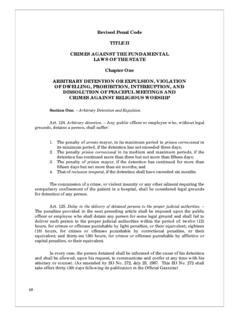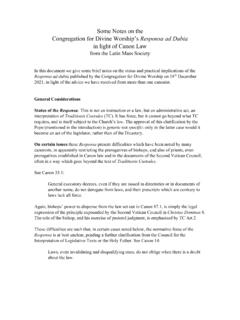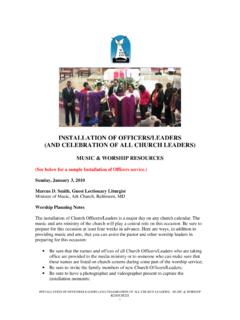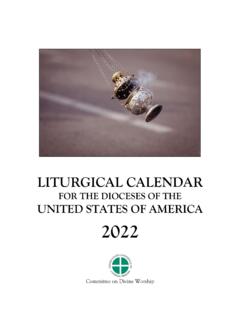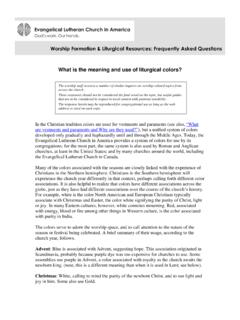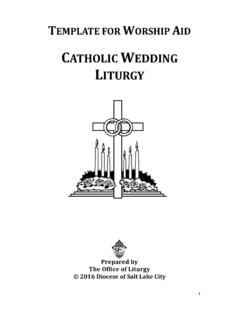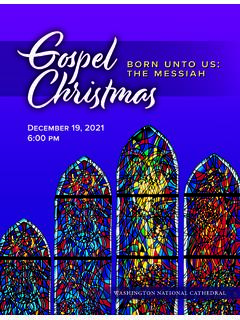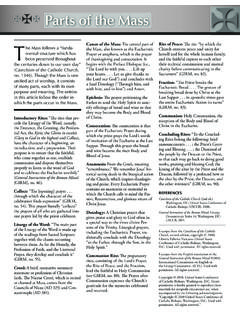Transcription of An Order of Worship for Holy Communion
1 An Order of Worship for holy Communion * Indicates the congregation standing. This service reflects the custom in which the congregation receives the Communion elements while seated, and then all partake simultaneously, using the trays with individual Communion cups. Where other customs prevail, the service may be modified accordingly. Prelude * Processional Hymn and Songs of Praise The congregation stands as the hymn is introduced. An acolyte bearing a festive banner (example at right) may precede the choir, clergy and others (such as an Elder to assist in Communion ) who will be leading Worship from the chancel. As the acolyte nears the chancel steps he or she turns the banner to face the congregation, while the choir and Worship leaders proceed to their places in the chancel.
2 The acolyte then places the banner in a standard to one side, facing the congregation. The processional hymn should be a traditional hymn glorifying the Lord. Examples: Praise to the Lord, the Almighty, All Hail the Power of Jesus' Name, Alleluia! Sing to Jesus, O Worship the King. (See below for additional suggestions.). The processional hymn may be followed by one or two more contemporary Worship choruses, such as Majesty, Worship His Majesty, Lord, We Praise You, Lord, I Lift Your Name on High, Glory to the Lamb.. (See below for additional suggestions.) There should be a good flow . from the processional Hymn through the choruses, with no pause for announcements and with smooth key transitions as needed.
3 * Prayer A Worship leader offers an invocation or other prayer of gathering, and seats the congregation. Welcome and Announcements Concerns of the church may be mentioned at this time, and visitors welcomed. As an alternative, this can take place just before the Offertory. Reading from the Epistle (or Old Testament). A reader reads the lesson from one of the Epistles or, as, appropriate, from the Old Testament. Children's Time Children are invited to come forward for a time with the Minister or other story-teller. The chancel steps are a good setting for this. It is desirable to use a Bible story that fits with the other lessons and sermon theme. If read from a picture book, scenes from the book can be projected on a screen with PowerPoint, if available, for the benefit of the rest of the congregation.
4 * Gospel Hymn (beginning). The first few stanzas of an appropriate hymn can be used to frame the reading of the Gospel. (See the list of suggestions below.) During the singing, the Minister takes the large Bible from the Communion Table and carries it part way into the congregation. The acolyte brings the banner and stands with him. * Reading from the Gospel The Minister reads the assigned Gospel passage as the people remain standing. The lesson may be inserted into the large Bible on a separate sheet before the service, so that it will be in the center of the Bible while being read. * Gospel Hymn (conclusion). The congregation sings the rest of the hymn while the Minister returns the Bible to the Communion Table, and the acolyte returns the banner to its standard.
5 1. Witness to the Word When the people have been seated the Minister gives the sermon. A member of the congregation may offer prayer for the sermon beforehand. The sermon should not be so long as to detract from the focus on the Lord's Table in this service. Pastoral Prayer If desired, the Minister may conclude the sermon with a prayer summarizing the thrust of the sermon and the concerns of the congregation. * Christian Greetings The congregation stands and exchanges the following greeting with the Minister, then with one another. This greeting time should not be rushed. Greeting: The peace of the Lord be always with you. Response: And also with you. Offertory The Worship leader hands the plates to the ushers.
6 The choir may sing an anthem as the offering is being received. * Doxology As the ushers bring the offering forward, the congregation stands to sing the traditional Doxology or other selection. (During Lent, an appropriate alternative is the first and last stanzas of When I Survey the Wondrous Cross. ) If someone other than the ushers will be distributing the Communion elements, such as Deacons, they should also come forward at this time to stand before the Communion Table. * Communion Prayer As the congregation remains standing, the Minister takes his place behind or aside the Communion Table. It is desirable that an Elder or other Worship leader join him. The Minister offers a prayer similar to the following.
7 It may have a seasonal emphasis; this example is for the post-Easter season. All glory is Yours, Almighty Father, for you chose us to be your people, a royal priesthood and holy nation, called from darkness into light to declare your mighty deeds. And when we turned from your way, you gave your only Son Jesus Christ to suffer death upon the cross, whereon he stretched out his hands between heaven and earth to make atonement for our sin and reconcile us to you. Then, through your might, he was gloriously raised from the dead, defeating the powers of darkness, opening the kingdom of heaven to all believers, and ever living to make intercession for His own. Therefore with angels and archangels and all the company of heaven, we praise you, saying holy , holy , holy Lord, God of power and might.
8 Heaven and earth are full of your glory. On the night he was betrayed the Lord Jesus took bread [here the Minister may take the bread and hold it up], and when he had given thanks, he broke it and said, This is my body which is for you; do this in remembrance of me. In the same way, after supper, he took the cup [here the Minister may take the cup in the same manner], saying, This cup is the new covenant in my blood; do this, whenever you drink it, in remembrance of me.. Send your holy Spirit, Almighty Father, to sanctify us as we receive these emblems of the life of your Son. Accept this, our sacrifice of praise and thanksgiving. And hear us, gracious Lord, as we renew our covenant to serve you in newness of resurrection life, bearing one another's burdens and so fulfilling the law of Christ.
9 Grant this, that at the name of Jesus every knee should bow and every tongue confess that Jesus Christ is Lord, to the glory of God the Father. Amen. Now, as our Savior Christ has taught us, we pray together. * Lord's Prayer The Minister and congregation unite in the Lord's Prayer, after which the congregation may be seated. 2. The Lord's Supper The Minister and Elder deliver the bread to the servers (ushers or Deacons), and the Elder offers a brief prayer before the distribution of the bread. When the ushers have returned and all have been served, the Elder serves the Minister. The Minister then may direct the partaking with these words from 1. Corinthians 10:16: The bread which we break, is it not a participation in the body of Christ?
10 Therefore we who are many are one body, for we all partake of the one bread. After all have partaken, the Minister and Elder deliver the trays to the servers, and the Elder offers a brief prayer before the distribution of the cup. The Minister then may direct the partaking, as above, with these words from 1. Corinthians 10:16 and Psalm 116:13. The cup of blessing for which we give thanks, is it not a participation in the blood of Christ? I will lift up the cup of salvation, and call on the name of the Lord. When all have received the cup and the servers have returned the trays to the Communion Table, the congregation may unite in the following or similar prayer. It is desirable to have large-print copies on the Communion Table for the benefit of the servers.
